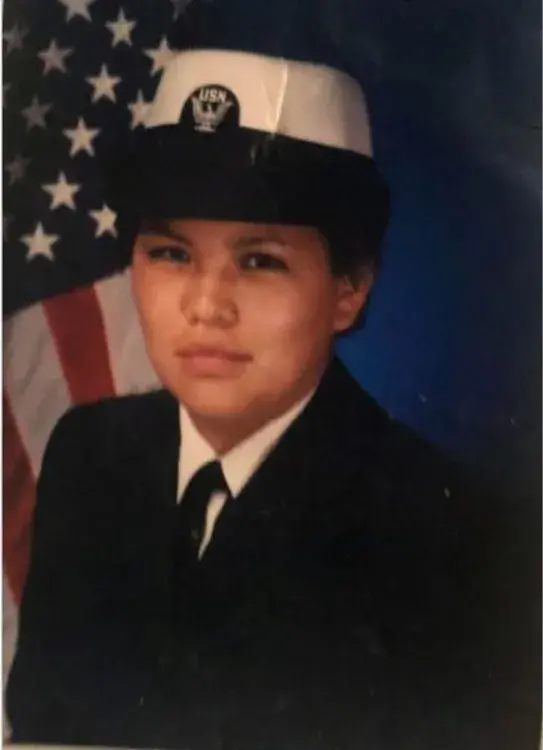From 1988 to 1992, Lorraine Mundy of Yuułuʔiłʔatḥ served in the U.S. navy as an electrician.
It was after high school when she went to visit her aunt in Los Angeles who was married to a U.S. navy sailor and who was neighbors with a naval recruiter. Mundy’s aunt told the recruiter of the young woman's interest in joining the navy.
“Ever since I was 16 I just wanted to get off the reserve and go do something,” she said, adding that at the time she didn’t feel like college was for her.
Mundy was first in boot camp in Orlando, Florida and then went to school in Waukegan, Illinois, where she became an electrician.
According to Naval History Heritage Command, during the time of operation Desert Shield/Desert Storm in 1990, the U.S.-led military operation to defend Saudi Arabia and liberate Kuwait, women often took on roles such as air traffic controllers, logisticians, engineer equipment mechanics, ammunition technicians, drivers and radio operators.
At the time of Mundy’s service, women were not permitted on combatant ships, she shared.
According to Naval History Heritage Command, it was in 1994 that the first women served aboard a U.S. combatant ship.
“At that time, women didn't have much of a choice because they weren't allowed on combatant ships,” said Mundy.
For Mundy, she would either be stationed in San Diego or Norfolk, Virginia.
She was sent to San Diego.
“What I did was preventative maintenance onboard the ship,” shared Mundy as she reflected on her role in the U.S. navy. “When I was pregnant with my son, I used to drive people to and from the naval hospital.”
“The kind of ship we were on had a lot of shops on it, like machine shops [and] electrician shops,” she added. “What we did was go to other ships, combatant ships, and assist with anything that needed to be fixed.”
Mundy was watching the news at her home in San Diego when she saw that Iraq had invaded Kuwait, turning into the Gulf War.
“When I got on the ship that morning they told us what the plan was for all the ships,” she said.
For Mundy, the vessel she was aboard was given a date to sail to the Persian Gulf. Of two ships that had women on them, she recalls the destroyer tender was sent over before the submarine tender she was on.
“They were supposed to be there for six months, and then we were going to go after them,” she said.
“Every ship had a date in San Diego,” she continued. “Everything was over by the date that we were supposed to go.”
Mundy said her most memorable experience was during Fleet Week, when she departed San Diego to sail to Seattle, then to San Francisco.
“We're out at sea going from San Diego to Seattle, and me being an electrician they sent me up to the mast to change a light that had burned out,” shared Mundy. “And we're out in the open ocean, it was dark, [and] I don't know how high up in the air I was, maybe 50 feet.”
“That's what I remember the most,” she added. “But there were so [many] other things that I would think helped shape my life.”
“Just learning from other people [and] being in the service,” she added.
Mundy moved back home to Ucluelet after her four years of service.
“I didn't want my kids growing up in San Diego,” she shared. “The only parts of San Diego that I could afford [were] where there was a lot of gang activity.”
“I grew up in a small town and I didn't want to see my kids grow up around that lifestyle,” she said.
According to the U.S. Department of Veteran Affairs, between August 1990 and July 1991 more than 6,500 service members served in the Operation Desert Shield/Storm in the Persian Gulf.
“I just think of all the people who have served, I think it’s a big sacrifice that people give to their country,” said Mundy.







